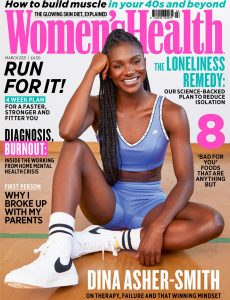
Women’s Health UK – March 2021
English | 131 pages | pdf | 58.1 MB
Letter from the Editor Women’s Health UK Magazine March 2021 issue
It’s lockdown, the trilogy – not the name of a predictable Hollywood blockbuster, but the life we’re all living (again). Necessary? Yes. Boring and monotonous? Hell, yes. Unsurprisingly, many of us are struggling mentally. The uncertainty that shrouds our future in a thick, suffocating fog is anxiety-inducing; the world feels chaotic, and as the winter months drag on, it’s bleak and depressing.
One of the many feelings I’ve been experiencing is loneliness. Late last summer, I sat in my spare bedroom to write my editor’s letter for the Women’s Health UK magazine September 2020 issue. As always, I spoke from the heart. ‘The truth is I’m lonely, and a bit bored,’ I wrote. ‘The lethargy is real; some days, my energy levels are so low I find it hard to motivate myself to commit to a day’s work.’ Several weeks later, a familiar red alert started appearing on the top of my Instagram app, telling me I’d been tagged in someone’s content; my direct message inbox was inundated, too. In moving detail, hundreds of women told me that they empathised; that they, too, felt lonely and isolated. One of them was an MP, who told me that I’d articulated in a few sentences what Parliament had struggled to grasp in its attempts to tackle the social epidemic of loneliness. In short, my letter struck a nerve and, in doing so, gave me a brief glimpse into a systemic issue that’s causing pain and suffering to many. Shortly after,
I asked my team to conduct a survey, and more than 2,000 of you responded. The findings were stark: 79% said they feel lonelier now than they did before the pandemic, a figure that rose to 87% among single people. As the head of this brand, I knew I had to act.
The result is our new campaign, The Loneliness Remedy. It’s based on a simple concept, rooted in the latest academic research on the significance of social connection: that, much as you eat your greens, plan your at-home workouts and take time out for self-care, working on your ‘social nutrition’ – cultivating meaningful connections and caring for others – is key to your health. Put simply, just as you strive to eat five portions of fruit and vegetables a day, you should aim for five socially nutritious interactions every day, too. Do that and you’ll bolster your ‘social biome’ – a metaphor coined by a researcher at the University of California. Much as you support the biome in your gut by eating a diverse range of plants, seeking out a diversity of social connections will help you to thrive, and protect you against loneliness.
You’ll find the results of our survey on page 114, along with do today tools to help reduce – and even prevent – feelings of isolation. Plus, you’ll find more evidence based advice on loneliness over on womenshealthmag.com/uk.
Before I sign off this month, I want to take a moment to celebrate our cover star. She’s the fastest British woman in history across 100m and 200m, a gold medal-winning world, European and Commonwealth champion – and, if the Olympics go ahead this summer, she’ll be gunning for glory. Not many people earn legend status, but Dina Asher-Smith is one of them. It’s a privilege to have her on the cover of Women’s Health – and I’m keeping everything crossed that she gets her chance to go for gold in Tokyo. As always,
I hope you enjoy the Magazine issue.
Until next month…
Claire Sanderson
Editor-In-Chief
Follow me on Instagram @clairesanderson
Download from:
NitroFlare